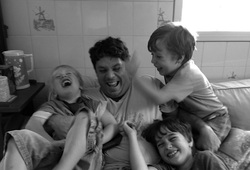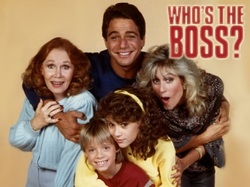We've moved to www.familyflame.net
 A few weeks back the father of a 12 year old boy sent me an email. He was having difficulty with his son and asked if I could help. It was a request for professional help but as I read it a thought came to my mind. This is a dad who wants to be a dad and a good one, but he is finding it tough. I invited him to come and chat about what was happening and we could take it from there.
As we started to talk, Jack shared how much he loved his son. He talked about the difficulties of seeing his son grow and change. He was once a good boy but seemed to be developing a rebellious, defiant streak. He was concerned because his son was not following through with some things and this needed to be addressed. He said that he loved his son unconditionally. However in the conversation he talked about how his son made him unhappy. We explored that a little more ... you love your son unconditionally but when he appears ungrateful or lacks effort, then he makes you unhappy. Pause ... What do you think the son thinks? This dad is sharp ... he knew where I was going ... he tells his son that he loves him unconditionally but his son picks up his father's disapproval when he doesn't perform. The son does not connect with unconditional love but performance. I don't think it's a huge deal when we admit we cannot love unconditionally. The problem comes when we say we do, but in reality we don't. That's what provokes the confusion and the conflict. Honesty is the best policy. And as dads we simply need to admit when we've missed it. Kids forgive and sometimes even forget. They'll give us the opportunity to get the mud off our faces and try again. Or maybe we simply need to direct them somewhere else? Our conversation continued into the revelation of God's love. Jack said without a doubt that God loves unconditionally. As we chatted more though he used the same words he'd mentioned earlier; 'I make God unhappy when...'. And that's really what I want to get at. I don't know if we can parent any differently than the way we see God parenting us. If we're confused about how He loves us, we'll reflect the same confusing love to our children - we don't even have to try! It just happens. That creates insecurities because we don't know if God is glad, mad or sad at us. This conversation went deeper with questions like; 'What is righteousness?', 'What do I have to do to be righteous?'. It amazes me that we can readily admit that God the Father demonstrated His love for us by giving us His Son Jesus. We know that this love is unconditional. Yet in the same breath we think that being free from sin, praying, reading our bibles and doing other good works makes us more righteous. As I said, Jack is a good dad and he wants to be. That unfortunately is the downfall of most of us. We want to be good. However the gospel is not about good or evil, right or wrong, success or failure but life and death. The good of the tree of the knowledge of good and evil, is still death. Jack has lots to think about. Righteousness is 'right standing'. We can have favour with the Father, be in right relationship with Him, because of what Jesus has done. Good or bad works take us neither closer of further away from the love of God. His love is freely given. He is a happy God and is completely satisfied with Jesus' obedience on our behalf. When we catch that, then our kids catch that. When we don't get that, our kids actually catch our own feelings of unworthiness before God. There is no perfect parent. Our kids don't need perfect parents. They need to know there is an unconditional love out there and it's from a loving Father. He is the one that will never fail us. One of my favourite songs is by Shane & Shane and they sing about a dad who loves his daughter. However, dad will fail and won't be there all time, but someone else will. You can listen to 'The One You Need' here. What's happened to Jack. I don't know yet. I've left him with some resources like 'The Gospel in Ten Words' by Paul Ellis and 'God's Kind of Love - The Cure For What Ails Ya' by Andrew Wommack. We'll hook up sometime in the next few weeks and continue chatting. My desire is that he will see he does not need to be the perfect parent. He is not trying to model that. If Jack thinks his job is simply to imitate Jesus by doing outwards works, he'll wilt under that pressure. He needs to simply connect with the life and unconditional love of Father God (that's what Jesus did) and help keep his son's heart open to do the same.  Have you ever wondered what causes a family to squabble and argue? Why the conflict? Why do siblings have to fight? I have a theory ... ok it's more than a theory ... it's an opinion that I think is based on truth. I won't be so bold as to say its the gospel truth because I am still learning ... but I think it's close.
The biggest family feuds I know of are related to inheritance. A parent dies and then the kids bicker over who should get what. Why? They are squabbling over what they have done and why they should get the greatest part of the inheritance. They have rights, they have worked, they should get a reward ... thinking like a servant. A servant is one who gets paid for what he has done. A servant looks at the work of his hands and says 'now give me what I deserve'. A servant aims to get what they think they deserve or they'll die trying. It is simply impossible not to have an argument or conflict with this mindset. The worst arguments are those between the servant and the son, because the servant cannot have, what the son is given. The best and easiest way to deal with this conflict is to throw the servant mindset out of the house. A servant is one who thinks it's all about him and the works of his hands. When it's all about you, then it's all about pride and Proverbs 13:7 say that 'only by pride comes contention'. Pride invokes conflict, it's a system of this world and you cannot change it. If we bring up our children thinking that they can earn or buy an inheritance from us (hey, that could be your love) we create a war against ourselves. On the one hand we offer them an inheritance, with the other, a reward system. Internal conflict follows, that leads to external conflict, which leads to siblings still fighting for an inheritance over a parent's death bed. I saw this for the first time in the story of Abraham. Now if you've been around christians you'll know that what you don't want to do is 'give birth to an Ishmael'. And that is usually explained as 'wait for God's timing' or 'don't take matters into you own hands'. Ok so that is important, but it's not the real issue. Hagar (Ishmael's mother) was Abraham and Sarah's servant. Ishmael was born of a servant. Ishmael could never have the inheritance. When we give in to conceiving something with a servant we create an Ishmael. When we require a servant or serving as part of our condition to give our children what they (or we) want, we create an Ishmael. An inheritance cannot be bought. You cannot get your share in the inheritance on what you do; you can only get it on what the parents have done. It's worth thinking about this. What are you offering your children - a reward or an inheritance? What do you think you would want as a child? Which is better? Jesus came to give us an inheritance. He came to restore relationships and families. He does this through revealing the Father, who then gives birth to sons. As parents we desperately need to see how God is fathering and parenting us. It's out of this revelation and transformation that we'll be able to pass this onto our children, that they too can share in the inheritance, and not have to try and earn it through obedience. It's not possible to fight and argue over something that is being given to you when what you're being given is based on the decision of the giver. It's his choice and it's based on something he has already done for you. That is great news if you're the one receiving the gift. It's terrible news if you're not. God demonstrated His love towards us by giving. As parents we need to keep giving until our kids realise that they can have because we are giving not because they are earning it. My mom is helping me edit (she picked up the typos in the first 2 blogs, as only mom's can, and find herself a new job) and her responding question was great. 'If you didn't want to know us and we chose to give Tracy (my sister) the inheritance, would it be because you didn't deserve it or our choice of giving?'. I think that we need to distinguish boundaries and the difference between receiving and deserving. We never deserve an inheritance. An inheritance is given by the choice of the parent. If I choose not to have anything to do with my parents, well then I don't receive the inheritance, but that doesn't mean it was not given. If as a parent we are deciding to give an inheritance on the basis of 'deserving', it ceases to be an inheritance and becomes a reward. We need to deal with both things here. Firstly, that as parents we see how God has given to us on the basis of inheritance. We don't model that but we let that truth sink deep into our souls until we believe it. When we see that He is a good Father, we receive the inheritance rather than trying to earn it. If we don't 'get it' or 'see it' in terms of our relationship with God as Father, I don't see how we can relate to our kids this way. Even if we see it, trying to live it or mdoel it, rather than letting it live on the inside of us, is a failing conformity and not a life giving transformation!  So we're driving home on Saturday afternoon and Quinn starts a conversation. Actually it's not really a conversation. He's got a little bit of a sulk going on because he wanted a green pair of shorts. He got sopping wet in the rain and we couldn't go to the shops because we're 45min from home and he is in nothing but his scants - and although this may be acceptable in South Africa, in Hong Kong ... he is about to become laughing stock of East Point City. So we've abandoned the shops and are on our way home. He and his brothers are being carefully dealt some sweets from mom. But Quinn still has a thick bottom lip and while I'm teasing him he offers me a sweet. I say no thanks because I don't want one from a sulker. He laughs and says 'Dad, you're not the boss of me, I want to give it to you, this if for you!'
So I pop the sweet in my mouth and I replied that he is quite right. I am not his boss, and he is not mine. He is free to give me the sweet. And then I am free to do what I want with it. He stops briefly to consider my statement because of course if he has given me the sweet then I must eat it... and of course I don't have to. That is my choice. We chat about how he can give me whatever he wants but I have the right to do with it as I want. He can't control that. What he can control is his heart. He can go with the freedom to give when he wants and not worry about the response. He does what is in his heart and then let's it go. He can love freely. By the same notion I can eat the sweet, give it away or throw it out the window. That's my choice. Gina shouts (in a lady like fashion) from the back, 'That's boundaries'. Yes, at last I have a nice example of an outworked boundary issue. A boundary is not a rule. A boundary positions you to take charge of yourself. A boundary gives you choice. It's incredibly liberating. Quinn 'clicked' on this straight away because I had the choice to say no to getting the shorts. He had the choice to enjoy the ride home or sulk. Kids are not stupid! When he saw I was making a choice and sulking was not going to change it, he moved on pretty quickly. Sure when he was 2 years old we had another way of dealing with this heart issue. Now he is a little older and we can work with the understanding. Oh ... and we did get his shorts ... the next day ... and he decided against the green shorts! I could have told Quinn that sulking children don't get what they want and as a result he cannot have the shorts. That's the rule and that's the punishment. But it's not the real issue. He needs to know that sulking shows he is not trusting in a good father who cares and provides. And it's his revelation of a father that changes how he lives as a son. He doesn't get because of what he is doing but because of what dad is doing to give it to him. A very pleasant place ... when you learn to trust. Boundaries and rules are simply not the same thing. Children do need boundaries and boundaries have everything to do with inheritance and a portion that is to your benefit. They need to understand their authority (what they are the boss of) and how that gives them freedom to walk in an inheritance. I don't know how to explain the link and I think I am still learning this. Look at Psalm 16:5-6 NKJV 'O Lord, You are the portion of my inheritance and my cup; You maintain my lot. The lines (or boundaries) have fallen to me in pleasant places; Yes, I have a good inheritance.' I am thinking that maybe we exercise our authority in the wrong place - over others. Maybe our inheritance is linked to exercising authority over ourselves and our circumstances. When we start doing that maybe we won't be some worried about exercising it over children and our children over us?  2 months ago we shifted our family system from stewardship (just another word for servant and I hadn't realised - a discussion for another day) to sonship. We were teaching our children that nothing belonged to them and that they simply looked after things and shared - a steward. It's sounds cool - 'all this belongs to God' - we just looking after it as if it's our own. The earth does belong to Him and everything in it. The good news is that the story doesn't stop there ... He came to give it to us as in an inheritance and we get to share! We sat down together, told them we'd missed it, didn't explain all the practical implications (kids don't need that - they'll figure it out - probably before we do) talked about ownership and it's like someone injected life into the home.
So what did we believe? A steward is one who looks after someone else's belongings as if they are their own. We had taught our kids that this is not really your toy. It's yours to steward. That way we nullified the whole idea that this is mine, and I am the 'boss' of it. No, it's not yours, it belongs to all and ultimately God. It does sound good but in reality its socialism. It had worked to a degree but Gina really felt the confusion that it created. I am giving you this toy for your birthday but hey it's only yours to look after, it's not really yours. We changed that belief system and explained it belongs to them. We asked them which they thought was the better deal - no surprises to that answer. It's theirs to share or not to share. They get to choose. Our jobs are to deal with their hearts and we do and will continue to do that. We have gone on to explain that this is their family too - their house, their home. A boss is a person who employs or superintends workers; manager; a politician who controls the party, organisation as in a particular district; a person who makes decisions, exercises authority and dominates. He is the master who orders about especially in an arrogant manner. This type of employer is not great to work for. Although the dictionary uses a family example, this has no place in family. Now my kids still use the word 'boss' but it's not about being 'boss' over each other. It's about using their authority as owners to share their belongings and display the love of a Father and the kindness of a brother. About 1 month ago we saw this outworked. Our helper was away for the month and with new found freedom the boys decided to help out. They didn't serve us; they took ownership for making the beds (Ben), doing the laundry (Jared) and unpacking the dishwasher (Quinn). They were not chores to them, they asked to help. It was an amazing month. They took charge, used their authority to get the jobs done. I dread to know how long that month would have been if they were doing chores! I love it when it feels like a cool breeze just blew through the house. And the best part is realising that it's not something I've done, or a new boundary put in place but simply changing what we believe. Often I found that it has to do with this servant vs. son mentality. I know that's Christianese and I apologise to those of you who may not be believers in Jesus. I'd love to know how to explain this without the jargon. My best bet is that a servant is not an owner, they get what they want through what they do, the laws they keep, their morality and basically serving you. In order for that to exist there must be a master or 'boss' who controls, commands and instructs. The bible tells us that God the Father is nothing like that and that Jesus came to reveal that. He doesn't control everything - He died and rose again so you could have freedom; His commandment is to believe upon Jesus and love one another; He instructs through His Word which always reveals Jesus. He doesn't relate to you on the basis of good or bad, right or wrong but on the basis of you being His son, through believing on Jesus. Choosing God as 'boss' or God as Father means a choice of life or death. The one operates on a system that will lead to death, the other a life giving relationship. Another family example is that of Mary, Martha and Lazarus. I'll pick the story up in Luke 10:38-42. Martha lets Jesus into the house and Martha is busy about serving Jesus. Mary just comes and sits at the table to listen to Him. When Martha says to Jesus to tell Mary to serve too (I am sure you've heard this before 'Why do I have to do everything, why can't she help me'), Jesus says that Mary has chosen the portion which is to her advantage (see Amplified Bible). That word for portion means to partake or sharing. What's the point? Martha says Mary must serve to get it, Jesus says she's already chosen the portion that will benefit her, why should she serve for it. That's the difference between a servant and a son receiving by inheritance. The story of this family coming back to life is found in John 11. Lazarus dies, Jesus asks Martha if she believes (she says she does), Jesus calls for Mary, she cries at His feet saying that if He'd come earlier Lazarus would still be alive, He raises Lazarus from the dead and then Jesus has to get out from being amongst the Jews. In John 12 He returns to Bethany and the house of Mary, Martha and Lazarus. Lazarus sits at the table, Mary anoints His feet with oil and poor old Martha is still stuck serving. You've probably heard a lot about worshipping God vs. serving God if you've had any exposure to the Christianity. I think most of what I've heard deals with what Martha and Mary were doing, serving vs worshipping, rather than what they believed. Mary was a 'son' - she took the portion to her benefit and as a result when Jesus served her (raised her brother from the dead) she was free to respond appropriately. I don't know if Martha should or should not have been serving in John 11 - someone had to get the food on the table. What I do know is that Mary clearly did not have Martha's mindset and it did not stop Mary from seeing the majesty of God. It did the exact opposite. She was able to see the miracle Jesus had done, acknowledge He had done it at the first opportunity He returns to her home, fell at His feet in adoration and changed the fragrance of a room with extravagance. Wow - simply because she saw God serving her, giving the portion to her benefit instead of serving for it. I think we are seeing this bring life to our family. The further we get away from serving God and being His servants to being His 'sons', identities and dreams are being lived. Oh I know that John 12 goes on to talk about those that serve Him. But read one verse back ... only after you have left 'self life' and received 'zoe life'. You'll just have to hold those thoughts for another day...  In July 2011 while on holiday in South Africa I had a very distressing conversation with my son, Quinn, 4 years at the time.
We were having a dining room discussion regarding 'who is the boss' and he pipes up, 'God's the boss because He just tells us what to do' with full implication that you do it or else. My heart broke ... He saw both me and God as a task master issuing control and command! Ouch! In that moment I knew that the picture needed to change for both of us. I realised that I'd been so busy trying to work out my sonship that I'd forgotten that it's in discovering who and what a father is that you find your identity as a son. Oooooops turn around time. Over the next 12 months I started to see that it was not about a son serving a father but about a father serving a son. What? Well think about it... do you do more for your kids or your kids do more for you? Who works to pay for who to be educated? Who works for who to put food on the table? Jesus makes just this point in Matthew 20:28 where He says that the son of man came not be served but to serve. In John 5:19 He says that He can't do anything except what His Father is doing. Matthew 11:27 says that He came to reveal the Father. The point is that if Jesus came to serve us, could only do what His Father was doing, only do His Father's will and came to reveal the Father, what we have is not a Son serving a Father but a Father serving a Son. What we have is not man serving God but God serving man. Oh this is foreign but it's seriously life changing news. In the old testament you had a Levitical priest who served God day and night, and now we have a God serving and interceding on our behalf night and day. We are priests but of a completely new order. The old has gone and the new has come. This revelation just undid the control mechanism in our family and is continuing to do so. We no longer battle to find out who is in charge because we actually all are. We are all part of the family and we have a loving God who is working on behalf of all of us. The word 'boss' has no place in our home any longer. We are all sons in our house and growing as fathers. We all have our own race and because we love each we look out for the best options for one another. Does that mean we never fight or argue? Not at all. There is a part of us that forgets who is serving who, like God is serving us and then we try and take it for ourselves and make someone else our servants. But we are finding this new and living way. If you don't believe that God is serving you, the likelihood is that you will need others to serve you! Is it working you might ask? I don't know. We can't measure on the basis of performance. We're not trying to 'do' family 'right' or 'wrong'. We're learning how much we're loved and how to live in the life that being secure produces. Bosses and servants trying to work in a family destroy and devour each other. Father's and son's reproduce life together and we all seem to be living and loving life more than we did. This story does continue where it started and in July 2012 we were back in South Africa and we happened to stumble into the same conversation we had 12 months before. This time Quinn says, 'Dad, you're a boss servant!' We unpack it a little and what he clearly sees is Dad using his authority to serve. Yihah fear and control are losing their hold. When dad no longer becomes the roof over everyone's head, when the buck no longer stops with dad, when the family is not looking for a dad to fix what is wrong but to be a source of life in the family ... by stopping the competition for authority, we have the freedom to live in our abilities and that's what we've got the authority to do. Being the head of the home has nothing to do with being on top of the pile and everything to do with being life in the home. Being head of the home is not about being the boss making right and wrong choices ... it's much more a matter of life and death ... and we're determined to choose life.  My dream is to be a father. It’s not the dream I had when I was a little boy. That dream was to be an ornithologist. Together with my mom we’d saved and raised thousands of birds, starting with a pair of weavers that came down from our back garden’s willow tree. The dream died when I realised that I had no real interest in studying the growth cycle of the frog or dissecting a seed. I dropped the subject in my teens and only in my 20’s did I discover a love for biology in the form of human anatomy and physiology.
What I know now was that my dream wasn’t working with birds but the caring, the saving, the restoring, the watching of things grow. Being a father! For years I’ve felt a longing to share what God has done in my heart and whenever I do, it just comes out wrong. I’ve decided to now journey where my head and my heart connect with my hands and my speech. The heart has finally over taken pride, the fear of failure and being downright wrong to communicate the life that I live. So do we need fathers? Why did the Paul the apostle say that the Corinthians had many teachers but they needed fathers? Why did Jesus say that He came to reveal the Father? Why did he not say I have come to teach you a better way to live? I believe it is that teachers can teach you what they know and fathers reproduce who they are. Fathers help give birth to something. Teaching on its own is only behaviour modification. We need to become something by birth (not by training and our efforts) and then be taught who we are. Then we simply live out who we are rather than trying to become something. Jesus said that no man can enter the kingdom unless he goes through a birth process. God’s entire plan before the world began was not that we would be conformed, moulded and shaped by life and circumstances but that we should have a quality of life born on the inside of us. When something is ‘born’ it then simply ‘is’ and does not need to ‘become’. That’s the wonder of being a father. We get to participate in a life where our children are born in our image and likeness, and it’s without any effort. Myles Munroe says that ‘Fathers are difficult to find because fathering has more to do with care than with charisma. It has more to do with responsibility than with performance. It has more to do with leadership, accountability and love than with fame, exposure and glory. Fathering requires a commitment to nurturing and developing others rather than using and benefiting from others.’ Biological fathers and/or those that reveal the nature of fathering is why I write. I want to learn more about who I am as father and I want share that so that others can experience the life that sharing will reproduce. I truly believe as we unpack and discover who a father is, we’ll find ourselves living as both fathers and sons, reproducing both fathers and sons. |
 RSS Feed
RSS Feed